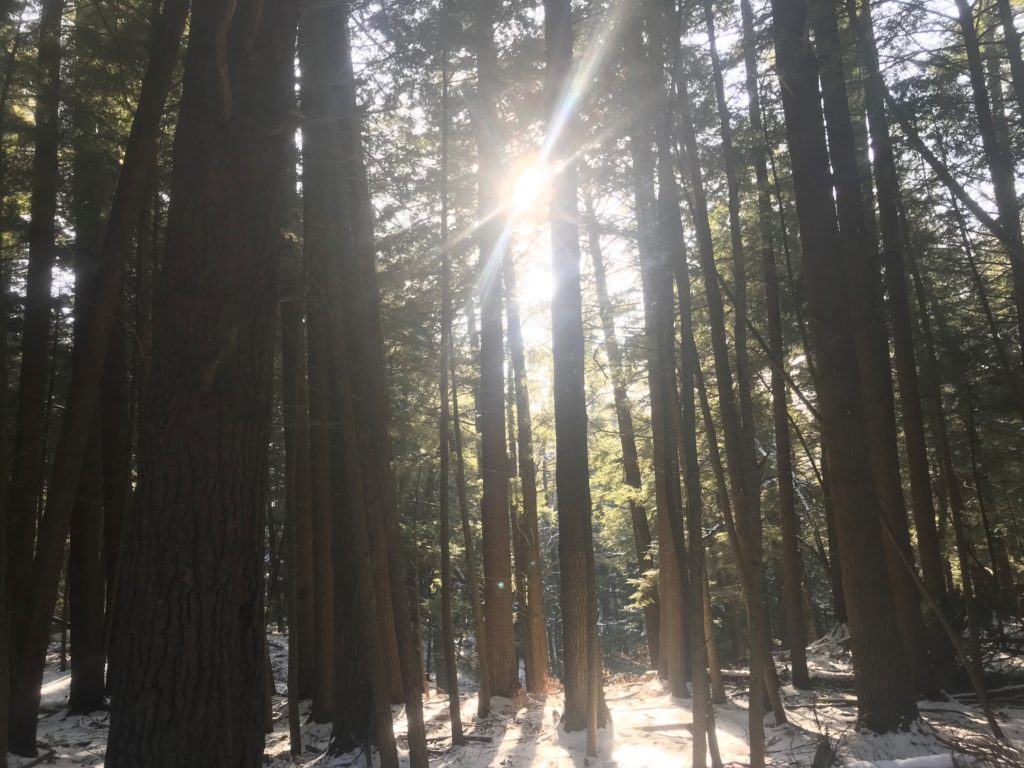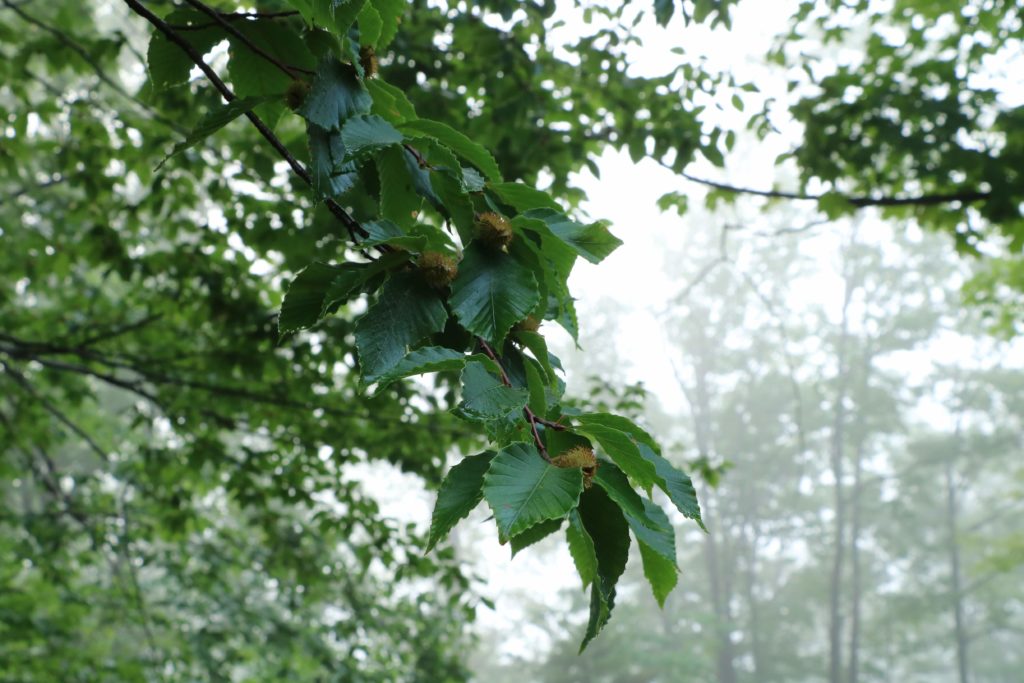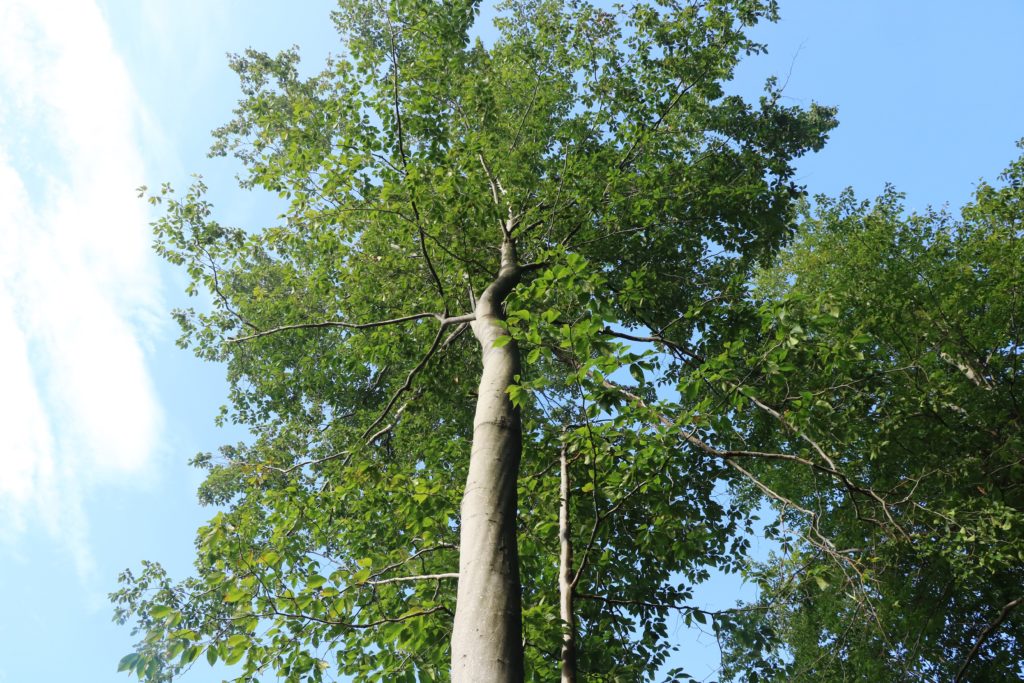Celebrating Nuance
 Written by Ethan Tapper (Chittenden County Forester, VT). Photos by Eric Hagen.
Written by Ethan Tapper (Chittenden County Forester, VT). Photos by Eric Hagen.
I lower myself down on the white wood of a freshly-cut sit stump and look over the fruits of my labor. All around me is a “mess” of my own creation; dead trees jumbled across the hillside, treetops and brush everywhere. Even to my eyes, which have been trained to see beauty in irregularity and complexity, the forest looks vulgar and wrong; defying the deeply-ingrained part of me which seeks order, tidiness and simplicity.
These are moments in the lives of foresters, forest-lovers, land stewards, and landowners that feel truly incongruous. I feel it as I stare up into the canopy of a living tree, my chainsaw bucking in my hands. I feel it as the crosshairs of my scope hover over the brown flank of a beautiful deer, picking her way through the autumn forest. I feel it as I spray a thin blue mist of herbicide over the leaves of a Japanese barberry. It’s a feeling of dissonance, the tension between two seemingly contradictory things.
In each of these examples, I believe that I’m doing the right thing. I cut trees to help my forest recover from a century of exploitation, to restore diversity and resilience. I kill deer to lower populations to a level that our ecosystems can sustain. I use herbicide to control non-native invasive plants, a fundamental threat to the integrity of our ecosystems and our precious biodiversity. It would be easy if I could love trees and not kill trees, love deer and not kill deer, mistrust herbicide and not use herbicide. But, like our forests, managing them is complex.

Beside me, my old Stihl chainsaw rests in the duff. This is the same tool that unscrupulous loggers used to degrade my forest decades ago, creating problems that I will spend my lifetime fixing. Like my rifle, like my backpack sprayer, this tool can be used to destroy but also to support biodiversity, the integrity of an entire ecological community.
In a world where so many things deserve our thought and attention, most people don’t have the bandwidth to give forests and forest management the complexity of thought that they deserve. People want to decide that forest management is “good” or “bad” and move on. Unfortunately, as most thoughtful forest managers know, forestry isn’t good or bad. Like my chainsaw, forest management can be a profound and positive force; making our forests healthier and more complex, supporting our communities and providing us with local, renewable, beautiful resources that we can be proud of. Like my chainsaw, forest management can also harm forests, can be unsustainable, can rob future generations of the opportunity to enjoy the same healthy, vibrant forests that we do. The line between these two things is fuzzy, complex, and nuanced. There are forest management practices that are appropriate sometimes, things that are true depending on the situation, and a host of different variables.
As people who love and manage forests, it’s our job to dive into the uncomfortable spaces between simple, incomplete truths. It’s our job to celebrate nuance and uncertainty, to have the courage to wade into uncertain waters. Doing so will require us to compromise, to listen, to be flexible and adaptive, to be humble and willing to change.

Embracing nuance means broadening our vision, considering a bigger picture of the ways our actions affect our world. Something that feels “right” for you might be “wrong” for the landscape and its ecological and human communities, just as something that feels difficult or challenging for you might support people and ecosystems in a broader sense. For example, preserving unmanaged forests is beautiful and important, the protection of something truly unique and special. But doing so by categorically condemning forest management can be more regressive than progressive, refusing to consider the idea that forest management could be done in a way that supports a healthier, more functional world. It can mean saying “not in my backyard” while displacing the impacts of our resource consumption on people and ecosystems who don’t have the privilege of saying that. In our complex world, unmanaged forests are appropriate sometimes, just as forest management is appropriate sometimes. Both have value, both are pieces of the same puzzle and neither is always right or always wrong.
I sit on my stump and watch the autumn light filter through the changing leaves, casting the world in gold. In a world of extremes, the real challenge to managing forests responsibly is recognizing that the truth is nuanced; it can’t be reduced to a simple, digestible soundbite. Doing right by our forests and by each other means taking the time and energy to dive joyfully into the nuances of a complex world, to make tough decisions and to do important, uncomfortable things. I don’t want to kill trees, kill deer, or spray herbicide any more than the next guy. I do so because it plays some small part in how I help build a better world. If it seems incongruous, it’s because it is. And it should be.
